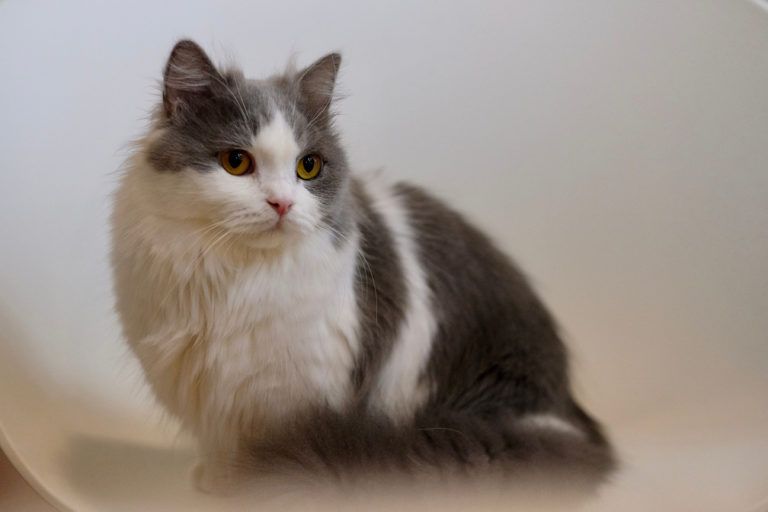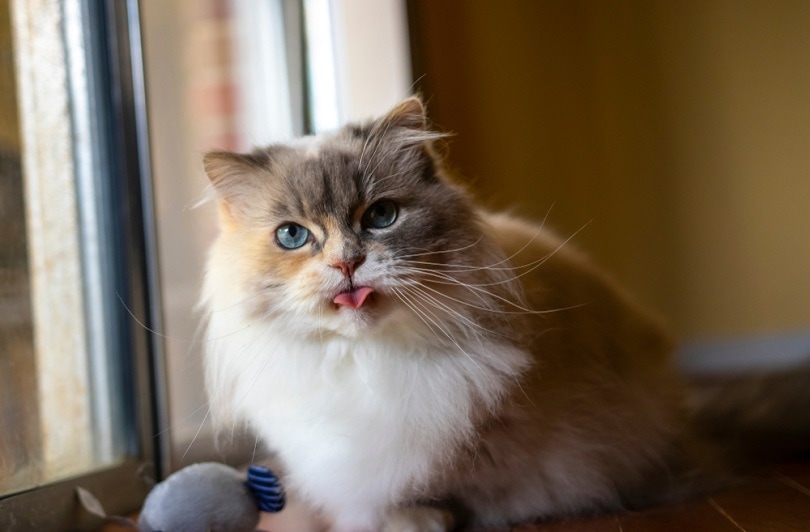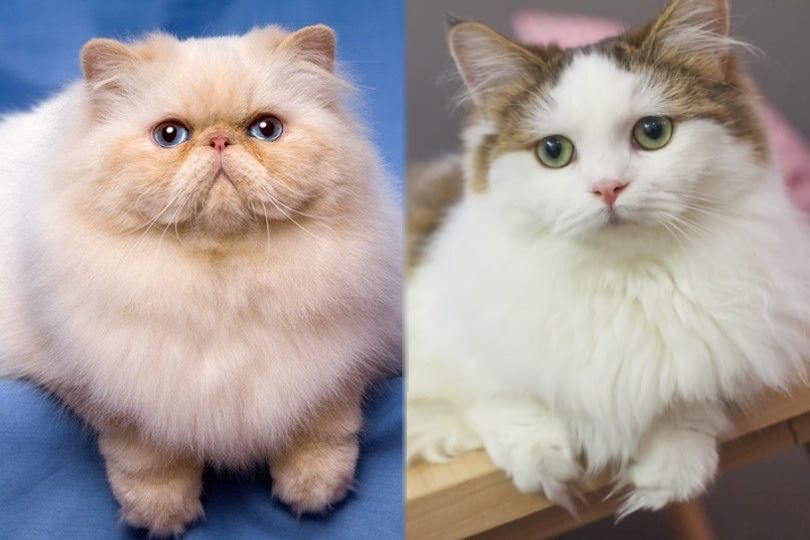
Click Below to Skip Ahead
The Napoleon cat is a newer breed. In fact, it’s so new that the Cat Fanciers Association hasn’t recognized the breed—at least, not yet. The Napoleon cat breed is a cross between the Munchkin and Persian cat breeds. The result? An adorable cat with short legs.
Joseph Smith, a Basset Hound breeder, is responsible for creating the Napoleon cat. He didn’t believe the Munchkin cat was distinguishable from other long-legged cat breeds. So, in the mid-1990s, Smith created a new breed. He chose the Munchkin and Persian because both breeds look exotic and have good bone structure.
Breed Overview
Height:
7 – 8 inches
Weight:
5 – 9 pounds
Lifespan:
9 – 15 years
Colors:
Various colors, including lilac, chocolate, tabby, bi-color, orange, black, etc.
Suitable for:
Singles, families with children
Temperament:
Social, loving, easy-going
Also known as the Minuet cat, this breed’s fur is plush and luxurious. There are longhair and shorthair versions. If you’re lucky, you may even find one with long legs. This breed loves attention from its owner, so don’t hesitate to pet your ducks and offer cuddles. If you need alone time and don’t feel like cuddling, don’t worry. The Napoleon cat understands your needs and happily obliges.
Think you might be interested in bringing this breed home? Then keep reading!
Napoleon Cat Characteristics
Napoleon Kittens
The cost of a kitten depends on lineage, color, and breed standard. Cost can also vary due to the experience level of the breeder.
Earlier, we mentioned that you could find a long-legged Napoleon cat. This variety is cheaper than the short-legged variety since the short-legged ones are in high demand.
Most breeders include vaccinations, microchipping, neutering or spaying, and registration at this price. However, every breeder is different, so keep that in mind. You’ll also want to include travel costs to go pick up the kitten.
Always check the breeder’s credentials and ensure you’re adopting a healthy and well-socialized cat. Some breeder’s may require a deposit, plus, the waitlist for this breed can be as long as 2 years.
You can also try adoption shelters near you. However, the likelihood of finding a Napoleon at a shelter is slim.
Temperament & Intelligence of the Napoleon
Napoleons are sweet and docile cats. They’re not demanding or attention-seeking, but they love cuddling with their owners. You can think of the Napoleon cat as a silent cuddle bug.
Napoleon cats aren’t obnoxious about receiving love. They appreciate their alone time also. However, they might follow you around most of the time.
These cats are social and curious but not talkative, like Siamese cats. They do best around humans and other pets. It’s a good idea to hire a pet sitter to keep your cat company if you plan to be absent from home for a long time.
Are These Cats Good for Families? 👪
Napoleons are excellent family pets. They love children and building relationships with their owners. You can expect your Napoleon to participate in household activities frequently. Keep an eye on your children since one wrong moment can ruin the entire experience.

Does This Breed Get Along With Other Pets?
Napoleons are also great with other pets as long as they’re introduced properly. Their easy-going nature carries over to other pets. Napoleons shouldn’t have much trouble adjusting to new pets, even as adults. Just be wary of small pets, like rodents.
Things to Know When Owning a Napoleon:
Food & Diet Requirements
Napoleons need a diet rich in protein. This can be obtained through standard cat food—dry or wet. You can try feeding a homemade diet, but follow cat nutrition guidelines to avoid nutrient deficiencies and health concerns.
Knowing what to feed your cat depends on the cat’s age, weight, and energy output. A cat is considered a senior cat when they are 7 years old, so you may need to start supplements or switch to different food as your cat ages. Generally, housecats should be fed about ¼ cup of dry food twice a day.
Talk to your veterinarian for nutrition advice if you’re unsure about feeding your Napoleon.
Exercise 🐈
Although they’re docile, Napoleons have moderate to high activity levels and need frequent exercise. This breed can’t jump well because of their short legs, but they’re always up for a play session and typical cat antics. You might get a long-legged Napoleon. If that’s the case, your cat shouldn’t have as much trouble jumping.
It’s always a good idea to keep cat trees, tunnels, toys, and shelves in the house to keep your cat company. Napoleons aren’t countertop dwellers, so they might appreciate shorter cat trees.
Training 🧶
Training is actually easier than you would think with Napoleon cats. Litter box training is a no-brainer, and you can even teach your Napoleon to sit, stay, find treats, and more.
Leash training is a possibility with this breed. It will take some time to get your Napoleon used to a leash, though. Cats need more time to adjust to new environments and commands, especially things that are outside their normal behavior. But once they do, they love the sight of the leash and be thrilled to go on walks outside.
Grooming ✂️
You won’t need to bathe your Napoleon as much as you need to brush them. Longhaired Napoleon cats require a thorough brushing once or twice a week to avoid mats. You’ll be happy to know that their silky hair helps prevent mats. Napoleons with short hair should be brushed every other week.
Like with any cat, you need to regularly clean their ears. White vinegar and a cotton ball are all you need. Don’t use a Q-tip! You can also talk to your vet about prescribed ear cleaners if you notice residue in your Napoleon’s ears.
To prevent dental disease, you also need to brush your Napoleon’s teeth as often as possible. Enzymatic toothpaste is best for breaking down tartar buildup. You can use a baby toothbrush or a finger toothbrush to help distribute the toothpaste on the teeth.

Health and Conditions 🏥
The Napoleon is considered a healthy cat. However, all housecats are prone to diseases like obesity, dental issues, allergies, parasites, and vaccine-preventable infections. Cats, in general, have other serious health issues like renal failure and kidney disease.
Napoleon cats are predisposed to the same health conditions as Persian and Munchkin cats, so it’s good to be aware of these ahead of time. Always ask your breeder about any hereditary conditions in your cat’s bloodline. Breeders are required to share this information.
Serious Conditions:
Minor Conditions:
Male vs. Female
There aren’t many differences between the male and female Napoleon cats. A male might be bigger than a female, but that’s it. You’ll find that these cats are more about individuality. They have unique personalities, regardless of their sex.
3 Little-Known Facts About the Napoleon Cat
1. Napoleons can’t jump like other cats.
Napoleons have shorter legs than most cats, so they can’t jump as high as the average cat. But they don’t let their little legs stop them! Napoleon’s can still get where they need to go at the same running speeds as the average house cat.
2. Napoleon cats are adored for their meerkat-like stance.
Because of their long, slender bodies and short legs, Napoleon cats sit on their butts just like a meerkat. It’s possibly the most adorable thing you’ll ever witness.
3. Napoleon cats are named after Napoleon Bonaparte for their short stature.
Who else would Napoleon cats be named after? Napoleon Bonaparte, a French military and political leader, was also known for his short height. It seems only fair the Napoleon cat carries on his legacy.

Final Thoughts
Napoleon, or Minuet, cats are unique-looking felines with special medical conditions. But these conditions don’t hold back this breed. Napoleons are still full of cat antics and want to be close to their owners. This breed is new, so there’s still much to learn. We know that, despite their short legs, they’re just like any other domestic cat—loving, caring, and ready to pounce on the next cat toy that rolls its way.
Featured Image Credit: Robert Way, Shutterstock






